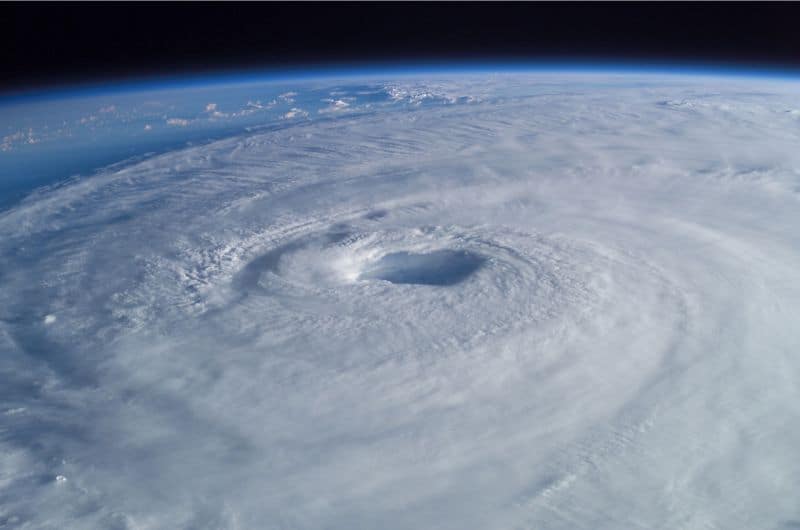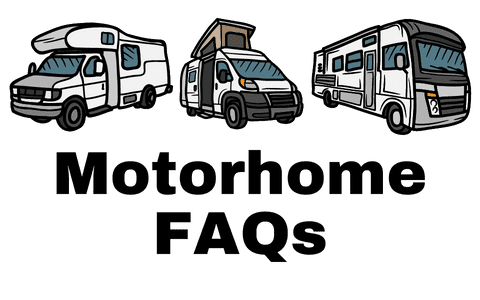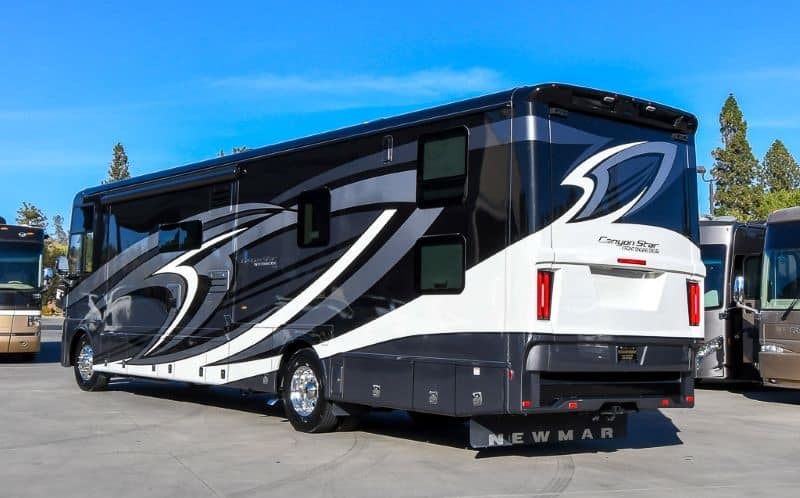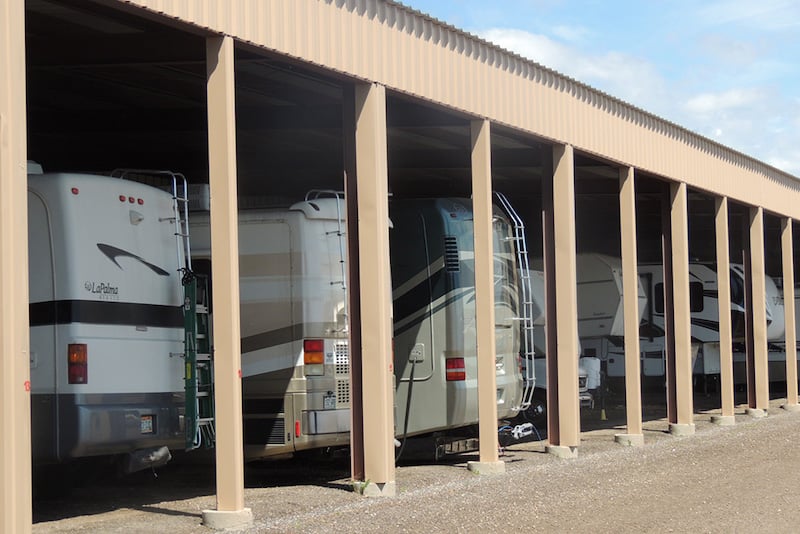The best way to secure your RV during a hurricane is to drive away as soon as possible. Unfortunately, life isn’t that simple. Obligations and resources can prevent you from dropping everything and fleeing the predicted path.
Hurricanes can be scary events, with strong winds and heavy rainfall that can cause massive damage. You can protect everyone and minimize the damage to your RV by following some precautions. Let’s look at how to secure your RV during a hurricane and other hurricane preparedness tips.
8 Ways to Secure Your RV During a Hurricane
1. Try to Park Your RV Somewhere Safe
Your best bet to secure your RV against the hurricane is to park it inside or directly next to a fixed structure (preferably away from any trees). This will protect the RV from high winds, downed trees, and airborne debris.
2. Find Yourself Solid Shelter
Campgrounds are required by law to have solid shelters for extreme weather. You’ll find that information in the literature they provide. Typically, bathhouses serve a dual purpose as storm shelters and are inspected for that purpose.
3. Anchor You Rig
It’s essential to secure your RV from hurricane-force winds by anchoring it down. Use heavy-duty screw-in stakes and straps to tie down your rig to the ground. This will help minimize the risk of your RV getting knocked over by high winds.
4. Secure Items Inside the RV
If your RV gets tipped over by strong winds, your things are likely to fall over. Pack everything up by securing cabinets and drawers with locks, ropes, bungee cords, and child safety locks.
5. Disconnect Electronics
If electronics are damaged in a storm, they can start a fire. To protect your RV, disconnect all electronics, and turn off the RV battery disconnect switch if you have one. If you don’t have this switch, safely disconnect the batteries.
6. Make Sure Your RV Is Level
An uneven RV is easier for the wind to tip over. Make sure your RV is completely level to help give some extra stability against wind.
RV auto-level systems will continue to adjust higher until the motorhome is level. The downside of this is that it creates a bigger ground clearance for the wind to get under your coach. Switch your RV leveling system to manual and balance it as low as you can.
7. Drive Inland on RV-Friendly Roads
The safest place to be during a hurricane is far away. If a hurricane is projected to hit you, head inland as soon as you can. Warm water speeds them up; land slows them down. Make sure you have your RV Life Trip Wizard or ToGo RV app trip planner ready to go.
8. Maintain Your RV to Minimize Damage During Storms
A well-maintained RV is a durable RV. You should be up to date on all maintenance before a storm hits.
Grab your silicone sealant and check your seams. If there’s a crack, water will find a way inside your motor coach.
Can High Winds Tip Over Your RV?
Yes, high winds can definitely tip over an RV. Wind speeds around 60 mph are sufficient enough to knock over many RVs. In a hurricane, wind speeds range from 74 mph up to 160 or more.
What Damage Can a Hurricane Do to an RV?
Heavy rain from a hurricane can damage your RV’s frame, features, and furniture if it finds a crack. Hurricane-force winds can knock over your RV or tear it apart.
Plus, hurricanes can knock down trees and branches, sending debris flying into your RV and possibly destroying your home on wheels.
How To Tell the Difference Between a Hurricane and a Regular Storm

A hurricane is much different from a regular storm. What makes a hurricane distinct are:
- Extremely high winds
- Expansive size
- A calm central eye
A hurricane’s destructive force is vastly more powerful than regular storms. The good news is that they build up in the ocean, they take days to rev up, and the National Weather Service has the technology to warn everyone in advance when one is coming.
13 Emergency Preparedness Tips for a Hurricane
There’s more to preparing for a hurricane than securing your RV. Here are 12 essential tips to be prepared for a hurricane.
1. Pack an Emergency Kit
You should have an emergency kit ready even when there’s no hurricane coming. Keep your kit stocked with important supplies:
- First aid supplies
- Medication
- Non-perishable food
- Bottled water
- Cash
- A weather radio
- Solar flashlight
- Batteries
- Identity, Insurance, and other critical documents
- Pet food and supplies for the fur babies
- 3 changes of clothes
- Other needed items
2. Stock Up on Food and Supplies
You’ll want to be ready with plenty of food and supplies to prepare for a hurricane. At a minimum, you should have one gallon of water per person to last several days, plus enough non-perishable food to last a week or more. Don’t forget about your fur babies.
3. Fuel Up
After a hurricane, it can be difficult (or even impossible) to find fuel. Make sure to fuel up before the hurricane hits, and once you’ve got a full tank, try to avoid driving as much as possible.
After you fill up your fuel tank, ensure you’re propane tanks are topped off as well. Call around first: motorhomers want to look for those places that refill tanks, not exchange tanks.
Be prepared for long lines at the gas, diesel, and propane stations.
4. Charge Your Batteries
Get prepared by charging all of your devices, battery banks, and rechargeable batteries in advance of the hurricane arriving. A hurricane is extremely likely to knock the power out, and in many cases, it will be weeks before power is fully restored.
5. Have a Road Atlas and Other Hard Copy Books
Power and internet services are likely to be knocked out in a hurricane. Cellular services tend to be extremely spotty after a hurricane as well. Instead of relying on Google, keep a hard copy of a road atlas, interstate exit guide, and any other important books around.
6. Post an Evacuation Plan
You should have a plan ready for evacuation and go over it with your whole family. Establish meeting points in case you get separated. Plan alternate routes and keep your go bags ready.
7. Make Sure Your Pet Can Be Identified
Pets get lost easily during the chaos of hurricanes. Make sure your dog or cat has their microchip with an active account, you have recent photos, and their licensing documentation.
Many animal rescue organizations have a central location where they bring lost pets for pet parents to find them.
8. Establish Communication Routes
Have a plan for how you’ll communicate and keep track of news and updates after the storm. Social media and other apps can be great tools, as can landlines and cell phones.
In case these aren’t available after the storm, be prepared with backups such as walkie talkies, CB, HAM radio, police scanners, or even satellite phones.
9. Plan for Power Needs
It’s likely you’ll need more than just one full battery charge after a hurricane. Have a plan for other ways to meet your power needs, such as a gas or solar generator.
10. Gather Cash and Essential Documents
Lack of power and internet connection means you may not be able to pay with a debit or credit card. Instead, keep a supply of cash and checks with you.
Essential documents like driver’s licenses, State ID cards, passports, social security cards, and medical documents should be safely stowed. All states have state identification cards available for minors if your family feels it’s necessary.
11. Update Your Insurance If Needed
You should make sure all your insurance information is up to date before hurricane season starts in June and usually ends by November. Contact your insurer and ensure all your information is accurate.
Go through your auto, life, RV, and other policies to have peace of mind you have the best coverages you need.
12. Take Pictures of Your RV Pre-Storm for Insurance
If your RV is damaged in a hurricane, pictures taken beforehand will help with the claim process. Take thorough pictures inside and out from many angles.
Most likely, insurance representatives will be on location, but you’ll be one of many customers. The more information you can provide, the faster they and the home office can process your claim.
13. Everyone Should Have Pictures of Each Other
If the worst happens and a pet or family member gets lost or separated from the group, pictures will be the best way to help you find them. Make sure the pictures are recent to make them as useful as possible.
How to Plan a Safe Evacuation Route in an RV
A major part of hurricane preparation is knowing your evacuation route. Know ahead of time what RV-friendly roads and highways you’ll take to head further inland (and consider finding alternate routes too).
If possible, you should also identify where you’ll stay, such as with a friend or in a government-provided shelter.
How Do You Know When to Drive Away from a Hurricane?
If a hurricane is projected to hit your area, evacuation is always best. Full-time RVs should leave sooner than later even if they’re within the outer band projection cone. Hurricanes tend to make a right or left turn at the last minute.
When that unexpected turn happens, it’s usually too late to escape. Even if where you were staying didn’t suffer significant damage, it’s better to be wrong for the right reason.
Part-time RVers that live in residential homes should stay informed with local news and weather. Make sure you’re aware of any voluntary or mandatory evacuation orders given by the state government, but most importantly, stay safe.
Is It Ever Okay to Hunker Down in an RV During a Storm?
Hunkering down in your RV and trying to ride out a hurricane is extremely dangerous.
RVs aren’t made or rated to withstand hurricane-force winds. If your RV is damaged in the storm, your life will be in danger. With no other available shelter, your safest option is to get out of town and head inland.
Remember: You Can Replace Stuff, Not People
The most important thing to do in a hurricane is to keep you, your family, and your pets safe. Have an evacuation plan, pack your emergency kits, and stay on top of all official communications.
To secure your RV during the hurricane and keep it safe, your best bet is to take it inland or store it inside a garage or storage facility. If that’s not an option, park the RV near a solid structure away from trees, level it and tie it down, and disconnect electronics to minimize the chances of damage.
About the author:
Jennifer Jennings is a full-time RVer and part-time van lifer. She is one half of DashboardDrifters.com and the founder of RVSpotDrop, a web service for full-time RVers.




